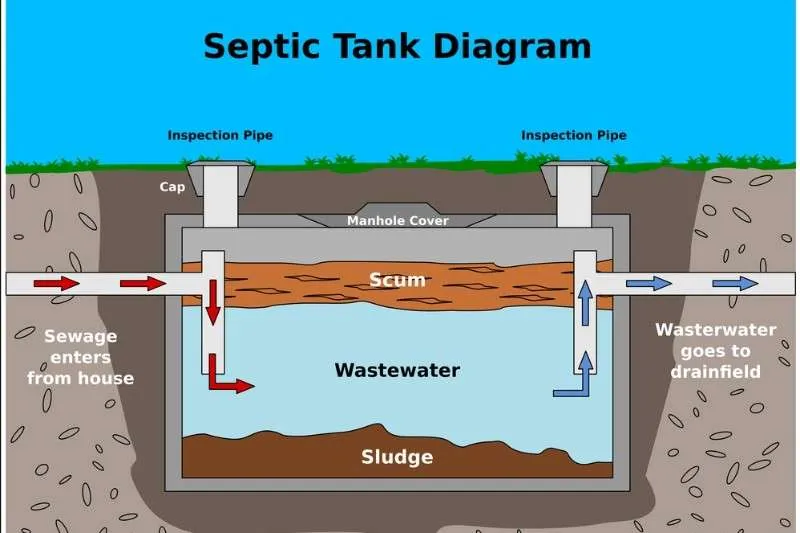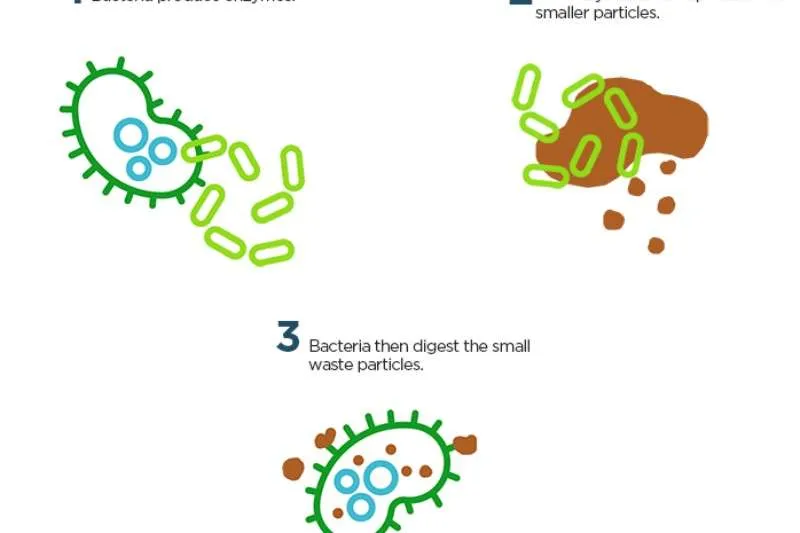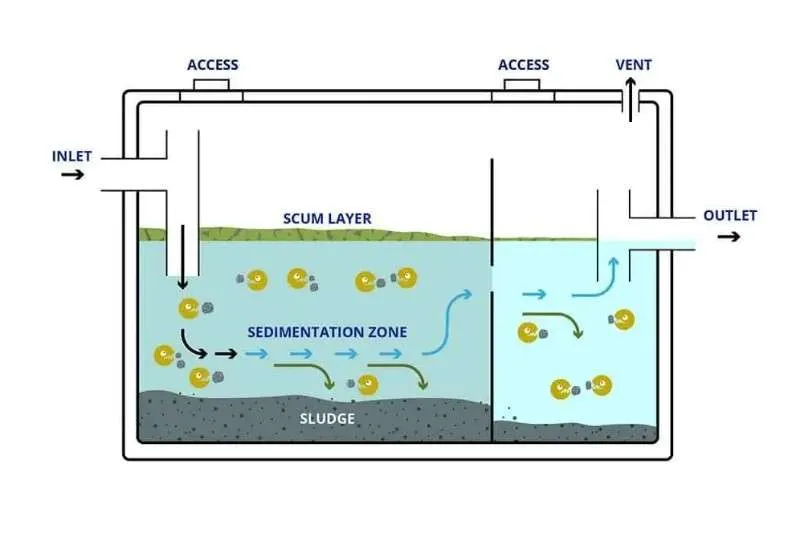If you have a septic tank system, you may know that grease is one of the most challenging substances to break down. This can complicate maintaining your septic system, considering the frequent use of greasy products in households and commercial food preparation.
So exactly what breaks down grease in a septic tank? Well, this is a question many people ask…and we’re here to provide expert advice on how to answer it!
Below we’ll explore everything from natural treatments for disposing of sufficient amounts of fatty waste material to microbial enhancers designed to break down grease effectively and efficiently within your sewage system. Read on for more information!
Introduction to Septic Systems: Basic Overview and Functioning.

Septic systems are useful for households and businesses not connected to main sewer lines. Septic tanks serve as a primary treatment and storage facility for wastewater produced by homes and businesses, and they can be an effective way of disposing of waste in areas not served by public utilities.
A typical septic system comprises two components: the septic tank, which holds wastewater, and the drain field, which disperses it into the ground.
The tank receives all incoming water inside the building, such as washing machines or sink drains. Wastewater settles in the tank’s bottom, while heavier solids settle at the top. Microorganisms within the tank break down organic material before it leaves the tank.
The effluent then flows through the drain field, which disperses it into the soil. The soil filters out any remaining contaminants and pollutants before they reach groundwater sources.
Septic tanks must be regularly monitored and maintained to keep them functioning properly and ensure that only clean water is released into the environment.
The Role of Bacteria in Septic Systems: How They Break Down Waste.

Bacteria are essential in septic systems, breaking down waste and preventing blockages. These septic tank additives are found naturally in the environment and can help keep it free of clogs, odors, and other problems.
Bacteria break down organic matter like grease through hydrolysis, which uses water molecules to release energy from the bonds holding fatty deposits together. As the bacteria digest these fats, they produce simple compounds that can be released as harmless vapors or used by plants for growth.
In addition, some types of bacteria may also help reduce the amount of solid material, such as sludge in a septic tank, by consuming suspended particles in the wastewater. With regular maintenance and replenishment of bacteria, septic tank systems can remain functional and efficient.
By understanding the role of bacteria in breaking down grease, you’ll be better equipped to maintain your septic system and keep it running efficiently all year round.
The Problem with Grease: How It Affects Septic Systems.
Grease is one of the most difficult substances to break down in septic tanks. Because of its high-fat content, it does not dissolve like other materials and can clog pipes, cause backups, and damage septic systems.
Septic system failure can cause Grease to build up over time and eventually cause blockages in pipes that carry wastewater from your home or business to the septic system. When this happens, the wastewater can’t flow properly, and the septic tank must work harder to process everything. Grease traps can lead to serious problems like flooding your yard or slow-draining toilets and sinks.
Oil and grease accumulation can also cause the septic tank to fill up too quickly, resulting in raw sewage being discharged into the environment. This poses a serious health risk, as well as potential fines and other penalties.
Types of Bacteria That Break Down Grease in Septic Tanks.
Septic tanks rely on naturally occurring bacteria to break down organic waste materials. Grease is one of the more challenging substances for bacteria to break down, but certain bacteria are well-suited to tackling greasy residue.
Some beneficial bacterial strains can convert grease into fuel sources — a process called bioremediation — which helps maintain an optimal balance in the tank and keeps your system running smoothly.
Pseudomonas and Bacillus are the two main types of bacteria used in septic tanks for breaking down fat, oil, and grease.
Pseudomonas specializes in breaking down organic compounds like proteins, carbohydrates, lipids (fats), and hydrocarbons; Bacillus has an enhanced ability to break down fats, oils, and greases that can be harder for other bacteria strains to digest.
These two bacteria strains work together to break down grease in your septic tank, and regular treatments of microbial enhancers can help keep the bacteria healthy and active.
These microbial enhancers contain additional beneficial bacteria that promote greater efficiency in breaking down fatty waste material, so it’s important to use them if you have frequent issues with grease buildup.
Enzyme Products: How They Help Break Down Grease in Septic Tanks.
Septic tanks rely on beneficial bacteria, high oxygen content, and proper maintenance to break down solid waste effectively for septic tank treatment. However, grease can be difficult to break down, so many professionals recommend using enzyme products.
Enzymes are proteins that act as catalysts in biochemical reactions. When used in septic tanks, these enzymes break down grease into smaller particles that bacteria can process. The result is a more efficient breakdown of solid waste material and improved tank performance.
Enzyme products come in both liquid and powder forms, with the latter being preferred as it is more effective at breaking down grease. To use an enzyme powder, pour it directly into the tank, and it will start breaking down grease immediately. The enzyme powder should be used regularly to ensure optimal septic system performance.
When using enzyme products, you can rest assured that they are not harmful to the environment or humans. Many professional septic tank services recommend their use to effectively break down grease in septic tanks.
Best Practices for Preventing Grease Buildup in Septic Tanks.
Reduce the grease used in your home or commercial kitchen using non-greasy alternatives when cooking and cleaning. Use parchment paper, aluminum foil, and oven mitts to prevent grease from entering your septic tank.
When disposing of large amounts of greasy waste material, opt for natural septic tank treatments like composting before using your septic tank system. Composting will reduce waterway pollution and help preserve the life of your septic system by preventing clogging and other issues resulting from excessive amounts of fat buildup over time.
To further protect your tank from grease buildup, install an interceptor between the drains and the tank to capture any solid fats, oils, and greases entering the system.
Regularly inspect your tank and its components for signs of grease buildup or blockages before they become a serious problem. Common issues to look out for include clogged outlet filters and pipes, slow-draining sinks and toilets, increased levels of sludge in the tank, odors coming from the drains, and drainage backups.
Utilize microbial enhancers designed specifically for grease-breaking enzymes to help reduce buildups in your septic system over time. These products are designed to break down proteins and fat molecules that traditional detergents cannot reach.
Have a professional inspect and pump your septic tank annually to remove any accumulated solid fats, oils, and greases. This will help ensure your tank remains in optimal condition and functioning properly.
Professional Septic Tank Cleaning: How It Can Help with Grease Buildup.
Septic tanks are an essential part of many households. However, as with any system, they require proper maintenance and care to keep them running smoothly, including dealing with grease buildup.
Professional septic tank cleaning services can help maintain your tank’s health and ensure it functions correctly. By regularly having your tank professionally serviced, you can reduce the risk of clogs caused by excessive grease buildup and avoid costly repairs or replacements.
The experts at professional septic cleaning services know how to tackle grease build-up safely and effectively without damaging your system.
They will also be able to offer advice on techniques such as regular pumping and maintenance that can prevent future build-ups from occurring.
FAQs
Does a septic tank decompose grease?
Yes, a septic tank can break down grease. However, it is important to remember that a grease trap does not decompose as quickly or efficiently as other materials, so it is important to take the necessary steps to ensure that your septic tank system can properly process fatty waste materials.
Does Ridex dissolve grease?
Ridex is a microbial enhancer designed to break down grease in septic tank systems. Chemical drain openers like this product introduce beneficial bacteria into the tank that can effectively digest fats, oils, and greases.
What eats sludge in a septic tank?
The bacteria breaking down the organic matter in septic tanks is anaerobic, meaning it does not need oxygen to survive. These bacteria break down the sludge layer, scum layer, and other solids in the tank.
What happens when you put grease in a septic tank?
When grease is added to a septic tank, it begins to settle at the bottom of the tank. This can cause clogs and blockages in the system and difficulty processing other materials.
How do I prevent grease build-up in my septic tank?
Regular maintenance and care are essential for preventing grease build-up in septic tanks. This septic tank maintenance plan includes avoiding hot water when washing dishes, regular septic tank pumping, and ensuring that fatty substances are broken down before entering the residential septic system.
Can you put baking soda in your septic tank?
Yes, you can add baking soda to your septic tank. Baking soda is a natural deodorizer that can help balance the tank’s pH. It can also help to break down grease and other fats, oils, and greases more efficiently.
Conclusion
Septic tanks must remain free of grease buildups to treat wastewater effectively. While bacteria play a major role in breaking down food solids in the tank, they cannot effectively deal with fats and oils. Further, these fatty substances can slow down the breakdown process and clog the system if not taken care of promptly. Fortunately, treatments such as enzyme products and professional septic tank cleaning services can help with this issue when it arises. Furthermore, homeowners should follow several best practices to prevent grease buildup in their septic tanks.


